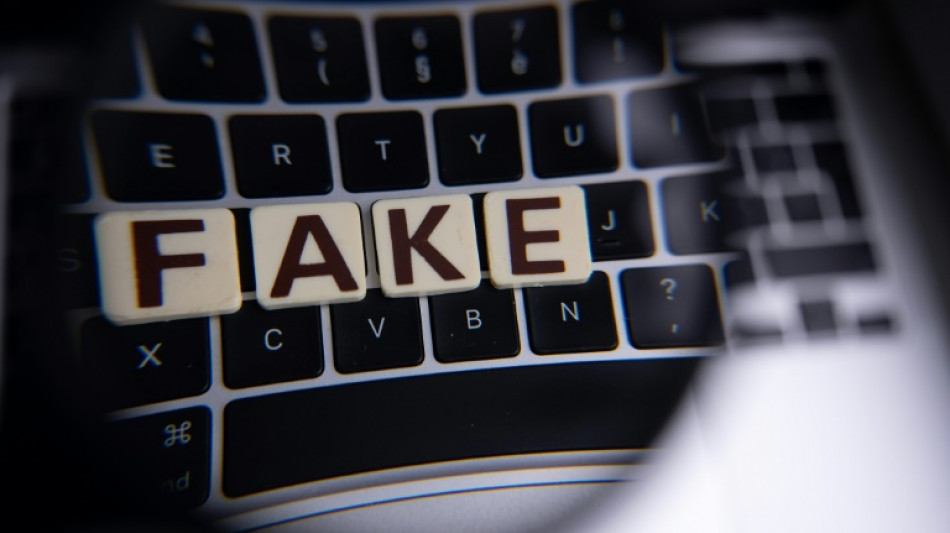
-
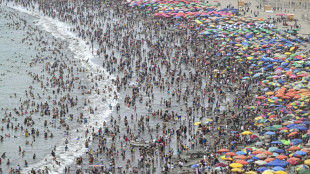 One of Lima's top beaches to close Sunday over pollution
One of Lima's top beaches to close Sunday over pollution
-
'Nothing is impossible': Shaidorov shocks favourite Malinin to make history

-
 Malinin wilts at Olympics as Heraskevych loses ban appeal
Malinin wilts at Olympics as Heraskevych loses ban appeal
-
Bhatia joins Hisatsune in Pebble Beach lead as Fowler surges

-
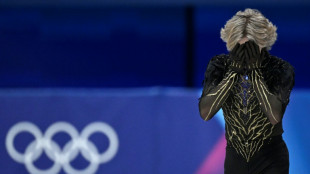 Malinin meltdown hands Shaidorov Olympic men's figure skating gold
Malinin meltdown hands Shaidorov Olympic men's figure skating gold
-
Top seed Fritz makes ATP Dallas semis with fantastic finish

-
 Patriots star receiver Diggs pleads not guilty to assault charges
Patriots star receiver Diggs pleads not guilty to assault charges
-
Havana refinery fire under control as Cuba battles fuel shortages

-
 Peru Congress to debate impeachment of interim president on Tuesday
Peru Congress to debate impeachment of interim president on Tuesday
-
Snowboard veteran James targets 2030 Games after Olympic heartbreak

-
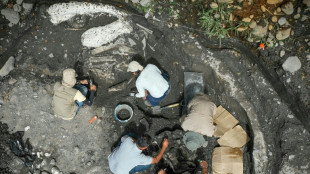 Costa Rica digs up mastodon, giant sloth bones in major archaeological find
Costa Rica digs up mastodon, giant sloth bones in major archaeological find
-
Trump says change of power in Iran would be 'best thing'

-
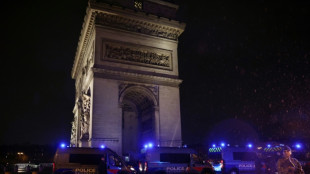 Paris police shoot dead knife man at Arc de Triomphe
Paris police shoot dead knife man at Arc de Triomphe
-
Japan's Totsuka wins Olympic halfpipe thriller to deny James elusive gold

-
 Canada's PM due in mass shooting town as new details emerge
Canada's PM due in mass shooting town as new details emerge
-
Neto treble fires Chelsea's FA Cup rout of Hull

-
 Arbitrator rules NFL union 'report cards' must stay private
Arbitrator rules NFL union 'report cards' must stay private
-
Dortmund thump Mainz to close in on Bayern

-
 WHO sets out concerns over US vaccine trial in G.Bissau
WHO sets out concerns over US vaccine trial in G.Bissau
-
Skeleton racer Weston wins Olympic gold for Britain

-
 Ex-CNN anchor pleads not guilty to charges from US church protest
Ex-CNN anchor pleads not guilty to charges from US church protest
-
Berlin premiere for pic on jazz piano legend Bill Evans

-
 Fire at refinery in Havana as Cuba battles fuel shortages
Fire at refinery in Havana as Cuba battles fuel shortages
-
A Friday night concert in Kyiv to 'warm souls'

-
 PSG stunned by rampant Rennes, giving Lens chance to move top
PSG stunned by rampant Rennes, giving Lens chance to move top
-
Japan's Totsuka wins Olympic halfpipe thriller as James misses out on gold

-
 Indian writer Roy pulls out of Berlin Film Festival over Gaza row
Indian writer Roy pulls out of Berlin Film Festival over Gaza row
-
Conflicts turning on civilians, warns Red Cross chief
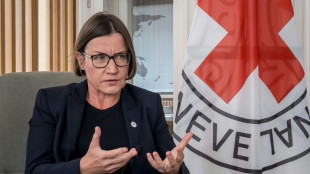
-
 Europe calls for US reset at security talks
Europe calls for US reset at security talks
-
Peru leader under investigation for influence peddling

-
 Rising star Mboko sets up Qatar Open final against Muchova
Rising star Mboko sets up Qatar Open final against Muchova
-
Canada PM to mourn with grieving town, new details emerge on shooter

-
 US waives Venezuela oil sanctions as Trump says expects to visit
US waives Venezuela oil sanctions as Trump says expects to visit
-
NBA star Chris Paul retires at age 40 after 21 seasons

-
 WTO chief urges China to shift on trade surplus
WTO chief urges China to shift on trade surplus
-
Vonn hoping to return to USA after fourth surgery on broken leg

-
 Trump sending second aircraft carrier to pile pressure on Iran
Trump sending second aircraft carrier to pile pressure on Iran
-
Heraskevych loses Olympics disqualification appeal, Malinin eyes second gold
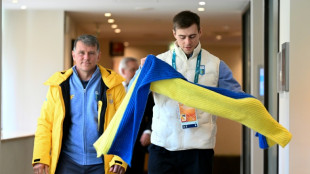
-
 Mercedes have 'taken a step back': Russell
Mercedes have 'taken a step back': Russell
-
Madagascar cyclone death toll rises to 40, water, power still out

-
 Earl says England inspired by last year's Calcutta Cup
Earl says England inspired by last year's Calcutta Cup
-
USA romp past Dutch in T20 World Cup to keep Super Eight hopes alive

-
 De Minaur scraps past local legend van de Zandschulp
De Minaur scraps past local legend van de Zandschulp
-
Ukrainian Heraskevych loses appeal against Olympics disqualification

-
 Ghana rallies round traditional tunic after foreign mockery
Ghana rallies round traditional tunic after foreign mockery
-
Forest set to hire former Wolves boss Pereira: reports

-
 England rugby captain Itoje slams Ratcliffe's 'ridiculous' immigration comments
England rugby captain Itoje slams Ratcliffe's 'ridiculous' immigration comments
-
Europe should speak to Russia with 'one voice', Putin foe says
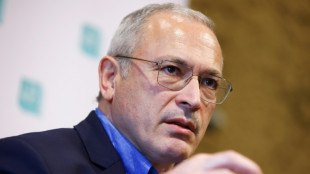
-
 US Congress impasse over immigration set to trigger partial shutdown
US Congress impasse over immigration set to trigger partial shutdown
-
US to deploy new aircraft carrier to Middle East as Trump warns Iran


New anti-Ukraine disinfo campaign aims to bog down Western media
A message on X asked a major French channel to verify what seemed to be a Deutsche Welle report about a Ukrainian artist who "sawed down the Eiffel Tower."
"I see these kind of stories every day. Official media don't talk about them, what should I believe?" "Kathe" asked BFMTV on December 4.
But this was no innocent question, this was part of an online disinformation campaign blamed on Russia that involves not just the spreading of anti-Ukrainian false news, but also challenges Western media outlets to verify it.
It first appeared in September, and is a "vast enterprise of diversion" targeting journalists, experts say.
It is seemingly part of Russia's war on Ukraine, almost two years on since Moscow launched an invasion that has claimed tens of thousands of lives.
The "Antibot4Navalny" collective that tracks inauthentic Russian-language accounts on X, formerly Twitter, has christened this new disinformation campaign, operation "Matryoshka", after the Russian stacking dolls that are placed one inside another.
In the space of a few hours, "Kathe" had also contacted dozens of other major French media such as Paris Match, FranceInfo, Le Figaro and Le Parisien.
The X account then remained inactive for two weeks before publishing a picture of graffiti, purportedly from Los Angeles and depicting Ukraine President Volodymyr Zelensky as a homeless person begging.
Subsequently, another X user asked various media to verify it.
The "Antibot4Navalny" collective trackers provided information that allowed AFP to identify scores of accounts that were also asking media to verify false stories.
The accounts AFP identified mostly appeared to have been dormant and then pirated.
These accounts posted frequently, sometimes as often as once per minute, in a tell-tale sign of false behaviour.
AFP analysis found that accounts requesting media to verify false news subsequently re-published them soon afterwards.
- 'Diversion for fact-checkers' -
Posts that are part of this campaign always target Ukrainians and attempt to foster the idea that Europe and the United States are weary of Kyiv.
Examples include thefts from the Paris catacombs by a Ukrainian, military aid misappropriated by Ukraine, doctored or fake graffiti of Zelensky, false adverts on New York's Times Square.
Most of these images were first posted by Russian users, generally on the Telegram social media platform and news blogs, according to AFP research.
This campaign followed in the wake of another in recent months called "Doppelganger", which consisted of posting anti-Ukraine fake images that impersonated Western media.
French Intelligence services attributed that to Russia, experts told AFP.
David Chavalarias, director of the French scientific research centre CNRS, said this campaign is about "diversion for fact-checkers" in order to keep them "occupied on crude subjects (that are) difficult to verify".
This campaign can also give visibility to false information, said Chavalarias.
"The goal seems to be to capture the attention of fact-checkers in order to interfere with their work," said researcher Julien Nocetti, who specialises in cyber issues.
He added that the objective also seemed to be to generate more long-term effects on the narrative of the war by testing the ability of certain content to go viral.
The Russians are learning "and there is a type of agility in testing different methods," he added.
A French security source told AFP that Russia is "looking for visibility, they want us to talk about them, for better or for worse".
- 'Battle of narratives' -
The same bots that took part in the "Doppleganger" campaign also shared anti-Ukrainian posts as part of the "Matryoshka" operation.
A December 2023 report by Insikt Group, the threat research division of US cybersecurity company Recorded Future, indicated that the "Doppleganger" campaign was still highly active on social media, using at least 800 bots dedicated to promoting fake news impersonating Ukrainian media.
According to German press last week, Germany has uncovered a vast "pro-Russian disinformation campaign" using thousands of fake X accounts to publish anti-Ukraine content alongside the visuals of German media.
"Ukraine continues to be the country most often targeted by information manipulation -- not by accident," European Union foreign policy chief Josep Borrell said last week during a press conference about disinformation and foreign interference.
"We are engaging on a 'battle of narratives'," he added. "Security is no longer just a matter of weaponry... It is a matter of information.:
P.Santos--AMWN
